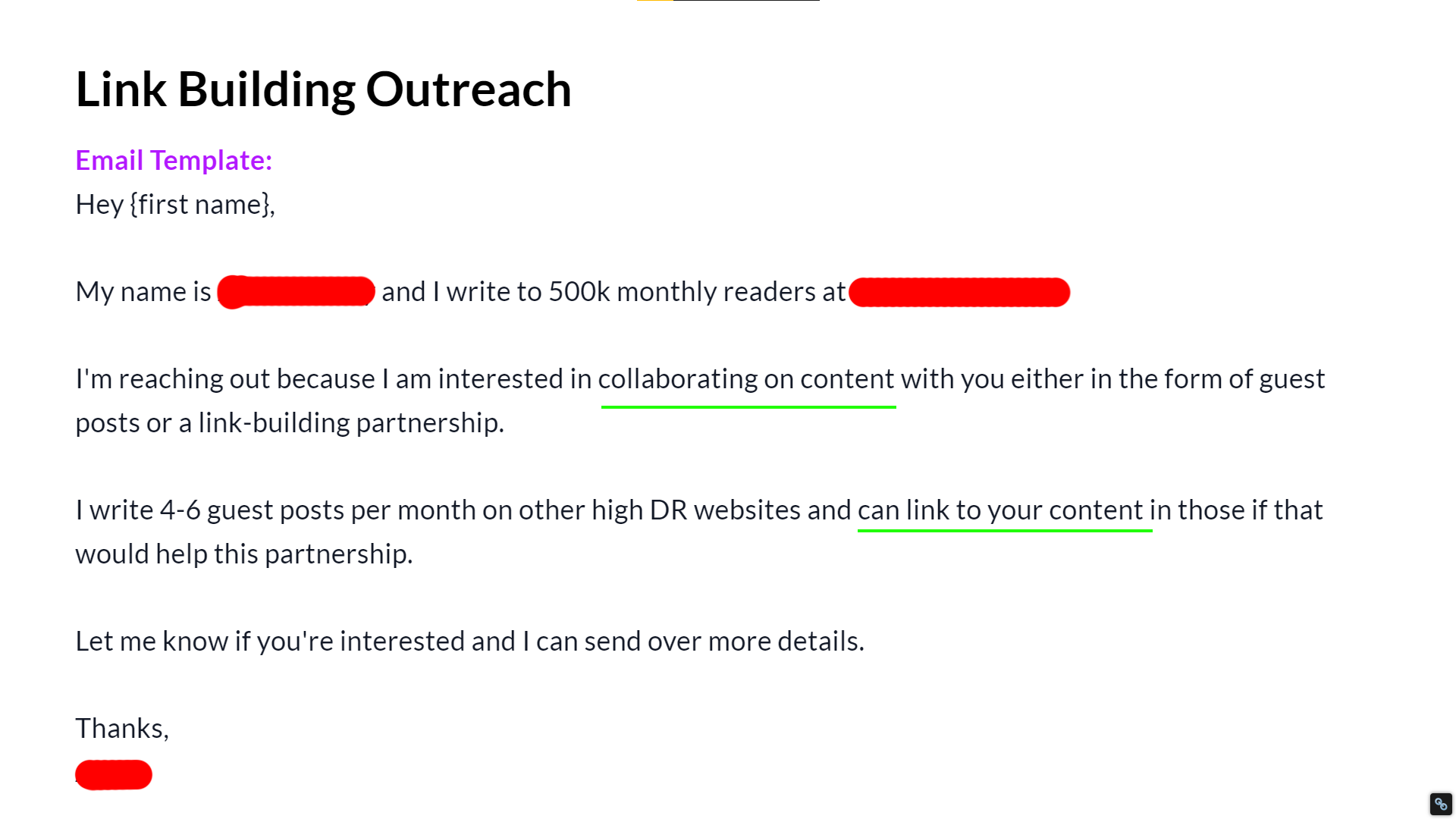In this guide, you’ll learn:
If you’re reading this article, there’s a chance that you’re looking for answers on how to get high-quality links.
Frankly speaking, though I love building links, I hate the work that needs to be done in order to get measurable results.
Tasks like:
- Finding quality prospects in bulk,
- Email hunting,
- Sending a cold email
- Following up, and lastly,
- Maintaining full records of it in a spreadsheet.
All these are not only frustrating but also take up a lot of time.
So when I find an easier way to do things, like say – spiderman’s link-building technique, I jump on it!
But why the heck do I trust your Spiderman’s way of building links?
If you rely on organic traffic without backlinks pointing to your website, it will be impossible for you to climb out of the Internet obscurity pit!
- But what if you could build 100+ links in a week and for zero money?
- What about getting 10+ links from 10 different sites from only 1 guest post?
- How about taking the help of Spiderman’s web-shooters to build those links on the web (World Wide Web)?
Sounds tempting, right?
WAIT, don’t let your excitement get the best of you?
I don’t want to bombard you with loads of information since, at the end of the day, you’ll be overwhelmed with so much data that you’ll paralyze yourself and do nothing.
Instead, let’s start with the basics and slowly work our way up by understanding:
#1: What is a link exchange?
In simple layman terms:
“Link exchange is an agreement between two websites to link to each other”
This is a mutual agreement in which website A agrees to link to website B and website B accepts that offer by re-linking to website A.
This typically occurs when 2 sites share similar content or customers.
An example would be if you run a business selling handmade teacups and I own a company selling handmade tea strainers – we may decide to link our websites together as we both offer products for sale related to tea accessories.
Not to be confused with some shiny names like, “Link swapping”, “Reciprocal links”, or “2-way link exchanges”, they all convey the same idea.
Talking about the idea, let’s try to understand:
#2: The core idea behind link exchanges
Link building has been a part of the internet for decades, so it’s no surprise that many businesses have been doing it for years.
Then why do we need a new concept like link exchanges and how it’s better than your old-fashioned link building?
The issues with the old link building methods are:
- You can’t keep getting new prospects forever
- You’ll run out of websites that hadn’t linked back to you yet
- Large corporations continue to make outreach managers’ lives more difficult by increasing their standards, so getting quality links faster is becoming a dream
The majority of the issues discussed above can be resolved with a link exchange.
Aside from that, the benefits it offers are that it’s:
- Highly scalable
- Easy to manage
- Requires minimal work on your end
If you’re still unconvinced, let’s see what kinds of link exchanges exist and then select which one is right for you.
#3: Types of link exchanges
One way, two-way, and three-way are 3 types of link exchanges that are commonly used in SEO campaigns.
One-way link exchange:
It’s just like one-sided love. You’re dying for them but they hardly turn back to you.
In simpler terms: A one-way link exchange occurs when a website links back to yours and you don’t reciprocate.
These days one-way link exchanges hardly work and that’s why we have the others.
Two-way link exchange:
This happens when two websites agree to link to one another, and both parties exchange links from their respective sites.
The disadvantage of two-way link exchange is that it’s quite simple to spot on a large scale, and thus many SEO experts believe it’s not a good approach to gain links.
Google might penalize your site for trading links in this scheme extensively.
Two-way link exchanges feel like this:

Three-way link exchange:
It’s known as the infamous Spiderman’s way of exchanging links.
Suppose you site A and there are 2 other sites named B and C. B linked to A and now A wants to return the favor. What A does is that he links to B from site C and this cycle goes on.
When exchanging links this way, there’s no way for Google to know that a link exchange occurred.
“Nobody’s gonna know”
And if two similar businesses swap links in the shoulder niche (because, naturally, rivals won’t link to each other) – they both benefit.
This model can also be replicated with Guest Posts and is known as:
Guest Post Swapping
Let’s try to understand guest post swap with an example with three sites A, B, and C.
A writes a guest post on B and links to site C in that post.
In return, whenever C will write a guest post for site D, he’ll include links to site A.
Why do we call this Spiderman’s way of link exchanges? Take a look at the image below:
#4: Will I get penalized for exchanging links?
In simpler terms, “It depends”.
Link exchanges have been a controversial topic in the online marketing world for years, but many experts agree Google is unlikely to penalize sites that participate in proper link exchange programs.
If you’re participating in a three-tier interchange program with do-follow links from good quality websites then you don’t need to worry about any penalties from Google.
Because Google can perceive it as a natural occurrence of two businesses testing one another’s products and showcasing their own goods, organic link building through clever link exchanges is frequently the greatest method to keep your site thriving and well-liked by search engines.
Link trading does not make or break your ranking position anymore unless you are doing something unethical – spamming dodgy low-quality directories, tiered link pyramid schemes, or forum spam.
In the last few years, tiered link exchanges have been massively devalued by Google’s webmaster guidelines and Google Penguin updates (wherein they targeted and penalized website owners who had used these exchanges with bad intentions).
Do not do any kind of link building in a way Google can detect it is artificial – this means you should avoid most directory submissions and 2-way/reciprocal links requests.
My advice: Only practice 3-way link exchanges/guest post swaps, and not reciprocal linking.
This implies that you should avoid linking to one another since this type of link flow will be much more detectable.
When websites do not connect to each other but instead utilize a third site, everyone can profit from the activity without being detected or banned.
Doing this not only diversifies your backlink profile but also spreads the link equity among the sites.
So don’t worry; enjoy yourself!
It really is a great way to get high-quality backlinks!
#5: BTW, is someone out there implementing these link-building strategies right now?
You might be thinking that whether all of this is actually practical or not.
Don’t worry, you’re not the only one!
The only proof I can share with you that this technique actually works is by sharing an email screenshot with you guys, my friend Palash received recently regarding link exchange.

And he receives a ton of link exchange requests via outreach to various sites in his niche.
So, yeah this link swapping works and we at Getmentioned do it all the time.
Furthermore, according to recent research conducted by Ahrefs involving 140,000 random domains with at least 10k organic visits per month, it was discovered that:
- 19% of the domains that ahrefs links to also link back to them, according to ahrefs themselves;
- Sites with reciprocal links made up 74% of all the sites;
- 27% of websites had at least a 15% overlap between sites they link out to and those that link back. (so essentially, 15% of their inbound links are the equivalent to a link exchange).
So yeah, these link-building strategies do work.
#6: How can you find websites and guest swap partners for exchanging links?
Finding worthy prospects for link exchanges is quite easy than it sounds.
Begin your list by starting with your contacts—anyone who has previously engaged with your organization.
I usually suggest beginning with clients, partners, and email subscribers.
They have a favorable opinion of your firm already and they’ve given you express permission to contact them.
If that’s not practical, then use yourself as a test for selecting contacts: Can I see myself clicking on an email from this person?
If the answer is yes, then move forward with contacting them.
When you’re starting off, this will work well, and once you’ve reached the tipping point, the time’s to go for bulk outreach.
You can leverage Ahrefs content explorer tool to find all the relevant sites in your niche and use an email finder tool like hunter.io to find emails.
You can then start the outreach process, set up follow-ups, and track your efforts via an email outreach tool like Mailshake or Pitchbox.
You can use this email template to reach out for link-building partnerships.

You can also go with various Facebook and Slack groups where you’ll find a ton of link builders that’ll join hands with the forces (you).
#7: What to check in a website before you start building links from it?
There are a ton of metrics to check before you begin building links to your site.
We won’t go into all of that here, but instead, talk about the 4 most important things you should check for before you jump right in.
Always verify if that site/blog post:
- Is Categorically Relevant – You don’t want a link between your entertainment site and an educational blog (which is irrelevant).
- Has Some Current Organic Search Traffic – A link from a DR 90 site isn’t particularly beneficial if the site’s traffic is low.
- Has Adequate Link And Content Quality – Avoid using nofollow links, and make sure that they are do followed, permanent, and crawlable by the search engines.
- Has The Authority You Need – If the DA/DR of a domain is lower than yours, it will barely pass any value.
To play safe, always go for sites that have a:
- DR (domain rating) greater than 40?
- Has over 5,000 organic visitors per month?
You may now make an educated decision about which types of websites will be the most beneficial to your company based on the information provided above.
You can get DA/DR metrics, traffic potential, backlinks count, and other SEO tools that will help you make better-informed decisions.
Depending on your business, you’ll need various kinds of websites to build links from.
And don’t forget to:
#8: Stay away from these websites for link building
There is no shortage of people who will exchange links to get you ranking higher in search results.
But just because someone is willing to give you a hand doesn’t mean it’s the best thing for your business.
It can be tempting to involve yourself in excessive link exchanges, but it might not always be a good idea.
So, always keep an eye for these metrics and avoid getting penalized by Google:
Outbound links ratio
Is there a higher outbound links ratio than 2 on the website?
For example, if 100 inbound links are present, you don’t want them to have more than 200 outbound links.
Why?
These sites giving out excessive links are classified as link-farm websites, PBNs, and other similar networks, which should be avoided.
Site age
In general, you should only trade with well-established websites that are at least a few years old.
Older the member’s website, the better the link quality.
Majestic Trust Flow
If you’re using Majestic, make sure the Trust Flow (TF) is at least 10.
Based on how trustworthy sites tend to link to reliable neighbors, Trust Flow is a number that predicts how trustworthy their web pages are.
#9: Conclusion: Should you exchange links?
Having a link-building strategy is a critical part of any SEO campaign.
It’s easy to get started, but it can take a lot more time and effort than you might think.
That said, the benefits are worth it because swapping links improve your search rankings (which means higher click-through rates) and they give you access to new audiences that may not have heard about what you offer yet.
If all this sounds interesting, let us know!
We’re always happy to work with clients who need help identifying which sites will provide them with the best ROI for their link-building efforts based on their niche or industry verticals.
Have you exchanged links via Spiderman’s way?
Let us know in the comments below!









 View another articles
View another articles